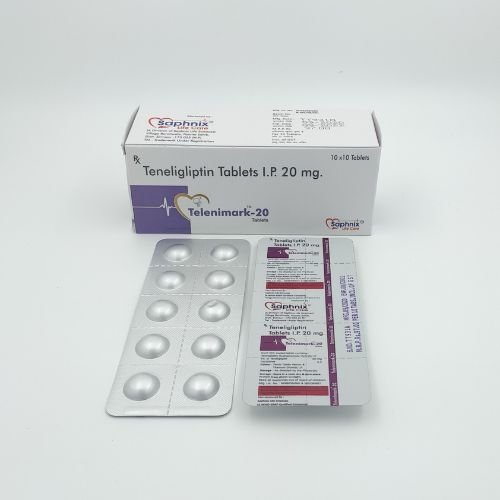- Home
- DIABETIC RANGE
- Glimepiride 2mg and Metformin Hydrochloride 1000mg Tablets

Telmisartan 40 Mg Tablets
October 8, 2020
Teneligliptin Tablets
October 8, 2020Glimepiride 2mg and Metformin Hydrochloride 1000mg Tablets
GLEMISAP-M2
Glimepiride and Metformin Hydrochloride Tablets combine two diabetes drugs, glimepiride and metformin. Glimepiride stimulates insulin-generating beta cells in the pancreas. Thus, insulin helps remove sugar from the blood. Metformin reduces sugar production by liver cells and slows sugar absorption from the intestine. In addition, it increases the sensitivity of muscle cells to insulin, which allows these cells to remove sugar from the blood more efficiently.
Uses Of Glimepiride and Metformin Hydrochloride Tablets
Glimepiride and Metformin Hydrochloride Tablets belong to a group of medicines called antidiabetic medicines used to treat type 2 diabetes, especially in patients whose blood sugar cannot be controlled with diet and exercise alone. Type 2 diabetes is a long-term (chronic) disease that affects the glucose processes in our body. People with type 2 diabetes either do not produce enough insulin or the insulin produced cannot do its job in the body (insulin resistance).
Dose and Duration
Consume Glimepiride and Metformin Hydrochloride Tablets as prescribed by your doctor. You are advised to take it for the complete duration as your doctor has prescribed it for you based on your health condition.
Side Effects Of Glimepiride and Metformin Hydrochloride Tablets
Generally, Glimepiride and Metformin Hydrochloride Tablets are well-tolerated and do not cause any side effects in your body. However, if any of the side effects occur they may disappear after some time. In case you observe any of the side effects such as Stomach pain, Nausea, Diarrhoea, Vomiting, Headache, Metallic taste, etc for a long time then consult with your health advisor or doctor immediately.
Precautions
- If you are allergic to this medication or any other medicines, tell your doctor. It is unsafe for children.
- Avoid breastfeeding during treatment with these Tablets, as they may pass into breast milk.
- If you are pregnant or plan to become pregnant, tell your doctor before taking it as it may harm the unborn child.
- Avoid using alcohol with these Tablets, as it may increase the risk of lactic acidosis (a build-up of lactic acid in the body). Only drive if you are alert after taking Glimepiride and Metformin Hydrochloride Tablets.
- Watch out for symptoms of hypoglycemia (low blood sugar) such as extreme thirst, dry mouth, skin, frequent urination, sweating, dizziness, palpitations, chills, etc. If you experience any of these symptoms, immediately consume 5-6 candies 3 glucose cookies or 3 spoons of honey/sugar and consult your doctor. Remember to always carry them with you, especially on long trips.
Storage
- Store it in a dry and cool place.
- Keep it far from the children’s reach.
- Place it away from the rays of sunlight.
Our Experts Advice
- Your doctor prescribed this medication as it can control blood sugar better than metformin alone.
- Do exercise on a regular basis, maintain a healthy diet, and consume your other diabetes medications along with Glimepiride and Metformin Hydrochloride Tablets.
- Consume this medication with food to reduce the chance of having an upset stomach.
- Check your blood sugar level in a regular interval of time while you are taking this medication.
- It can cause hypoglycemia (low blood sugar level) when taken with other antidiabetic medications.
- Inform your doctor immediately if you observe any rapid or deep breathing or if you have persistent vomiting, nausea, and stomach pain as it causes a rare but serious health condition called lactic acidosis, which is an excess amount of lactic acid in the blood.
- Your doctor may monitor your liver function regularly. Tell your doctor if you feel any symptoms such as loss of appetite, abdominal pain, or yellowing of the eyes or skin (jaundice).
| Packing | 10×15 Blister |
|---|






